Gain electrons - Study guides, Class notes & Summaries
Looking for the best study guides, study notes and summaries about Gain electrons? On this page you'll find 2113 study documents about Gain electrons.
Page 4 out of 2.113 results
Sort by
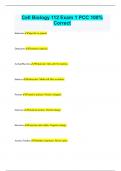
-
Cell Biology 112 Exam 1 PCC 100% Correct
- Exam (elaborations) • 13 pages • 2024
- Available in package deal
-
- $9.99
- + learn more
Cell Biology 112 Exam 1 PCC 100% Correct Induction Specific to general Deduction General to specific Archae/Bacteria Prokaryote. One-cell. No nucleus. Eukarya Eukaryotes. Multi-cell. Has a nucleus. Protons Found in nucleus. Positive charged. Nuetrons Found in nucleus. Neutral charge. Electrons Found in outer shells. Negative charge. Atomic Number Number of protons. Never varies. Atomic Mass Number of protons and neutrons in the nucleus. To determine number of nue...
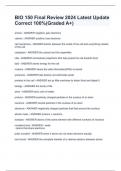
-
BIO 150 Final Review 2024 Latest Update Correct 100%(Graded A+)
- Exam (elaborations) • 10 pages • 2024
-
Available in package deal
-
- $10.99
- + learn more
BIO 150 Final Review 2024 Latest Update Canions - ANSWER negative; gain electrons cations - ANSWER positive; lose electrons cell membrane - ANSWER barrier between the inside of the cell and everything outside of the cell cytoplasm - ANSWER the cytosol and the organelles cilia - ANSWER microtubule projections that help propel the cell towards food lipid - ANSWER stores energy for the cell nucleus - ANSWER where the cells information(DNA) is stored lysosome - ANSWER help destr...
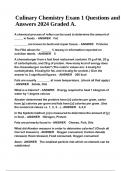
-
Culinary Chemistry Exam 1 Questions and Answers 2024 Graded A.
- Exam (elaborations) • 33 pages • 2024
-
- $13.99
- + learn more
Culinary Chemistry Exam 1 Questions and Answers 2024 Graded A. A chemical process of reflux can be used to determine the amount of ______ in foods. - ANSWER Fat _________ are known to build and repair tissue. - ANSWER Proteins The FDA allows for _______ % leeway in information reported on nutrition labels. - ANSWER 5 A cheeseburger from a fast food restaurant contains 19 g of fat, 20 g of carbohydrate, and 28 g of protein. How many kcal of energy does the cheeseburger contain? (The calor...
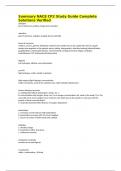
-
Summary NACE CP2 Study Guide Complete Solutions Verified Graded A+
- Exam (elaborations) • 22 pages • 2024
-
Available in package deal
-
- $12.39
- + learn more
Summary NACE CP2 Study Guide Complete Solutions Verified oxidation loss of electrons, positive charge atoms (anode) reduction gain of electrons, negative charged atoms (cathode) forms of corrosion uniform, crevice, galvanic (dissimilar metals) if two metals have to be couple then best to couple metals close together in the galvanic series, pitting, intergranular, selective leaching (dezincification, graphitization), velocity phenomena, environmental cracking (corrosion fatigue, hyd...
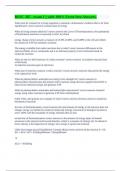
-
BIOC 385 - exam I || with 100% Error-free Answers.
- Exam (elaborations) • 30 pages • 2024
-
Available in package deal
-
- $13.99
- + learn more
What must be constant for a living organism to maintain a homeostatic condition that is far from equilibrium? correct answers constant input of energy What do living systems abide by? correct answers the Laws of Thermodynamics; the spontaneity of biochemical reactions is expressed as ΔGo' in kJ/mol energy charge correct answers a measure of [ATP], [ADP], and [AMP] in the cell and reflects the amount of ATP for metabolic reactions The energy available from redox reactions due to what? ...
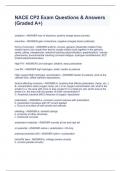
-
NACE CP2 Exam Questions & Answers (Graded A+)
- Exam (elaborations) • 22 pages • 2024
- Available in package deal
-
- $11.99
- + learn more
oxidation - ANSWER-loss of electrons, positive charge atoms (anode) reduction - ANSWER-gain of electrons, negative charged atoms (cathode) forms of corrosion - ANSWER-uniform, crevice, galvanic (dissimilar metals) if two metals have to be couple then best to couple metals close together in the galvanic series, pitting, intergranular, selective leaching (dezincification, graphitization), velocity phenomena, environmental cracking (corrosion fatigue, hydrogen embrittlement, SCC (Carbonates/b...
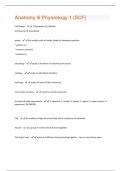
-
Anatomy & Physiology 1 (SCF) Questions and answers
- Exam (elaborations) • 16 pages • 2024
- Available in package deal
-
- $7.99
- + learn more
Cell Shapes - 1) Squamous 2) Cuboidal 3) Columnar 4) Transitional atoms - the smalles units of matter (made of subatomic particles- * protons (+) * neutrons (neutral) * electrons (-) physiology - study of functions of anatomical structures cytology - study of cells &their functions histology - study of tissues & their structures microscopic anatomy - examines cells & molecules Six levels of body organization - 1. chemical. 2. cellular. 3. tissues. 4. organs. 5. organ systems. 6. organ...
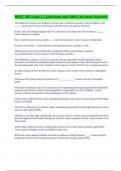
-
BIOC 385 exam 1 || Questions and 100% Accurate Answers.
- Exam (elaborations) • 20 pages • 2024
-
Available in package deal
-
- $12.99
- + learn more
The difference between an oxidation reaction and a reduction reaction is that oxidation is the _____ correct answers loss of electrons and reduction is the gain of electrons. If the Gibbs free energy change value for a reaction is less than zero, this reaction is ______ correct answers exergonic Flux is defined as the rate at which ___ is/are interconverted. correct answers Metabolites Enzyme active sites... correct answers Are characterized as a pocket or cleft Which answer correctl...
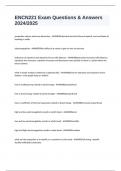
-
ENCN221 Exam Questions & Answers 2024/2025
- Exam (elaborations) • 28 pages • 2024
-
Available in package deal
-
- $10.49
- + learn more
ENCN221 Exam Questions & Answers 2024/2025 properties valence electrons determine - ANSWERSchemical electrical thermal optical, and contribute to bonding in solids electronegativity - ANSWERSthe ability of an atom to gain or lose an electron behaviour of repulsive and attractive forces with distance - ANSWERSattraction increases with distance, repulsion also increases. repulsion increases and decreases more quickly so there is a point where the forces balance what is elastic modulu...
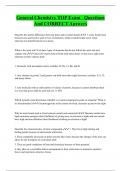
-
General Chemistry TOP Exam Questions And CORRECT Answers
- Exam (elaborations) • 65 pages • 2024
- Available in package deal
-
- $9.99
- + learn more
Describe the atomic differences between Ionic and Covalent bonds. 1. Ionic bonds form between ions and involve gain or loss of electrons, while covalent bonds occur when electrons are shared between two atoms What is the octet rule? List three types of elements that do not follow the octet rule and explain why. Octet rule=atoms tend to bond with other atoms so they have eight outer electrons in their valence shell 1. Elements with incomplete octets, includes: H, He, Li, Be, and B. 2. ...

$6.50 for your textbook summary multiplied by 100 fellow students... Do the math: that's a lot of money! Don't be a thief of your own wallet and start uploading yours now. Discover all about earning on Stuvia


